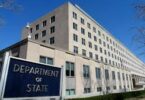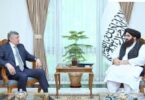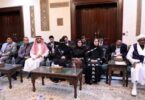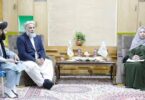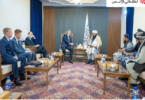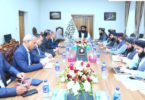Monitoring Desk
KABUL: Chief Executive Officer Dr. Abdullah Abdullah touts the freedom of expression as a fundamental success contributing to the promotion of human rights, social accountability in the country.
The Law on Access to Information has helped exposed the citizenry, including a vibrant civil society, to concepts and tools associated with human rights promotion and protection, he said.
Addressing the 37th session of the United Nations Human Rights Council in Geneva, he claimed Afghanistan had consolidated its human rights gains. “We are now honored to be an elected member of this grand Council…”
More importantly, the CEO said, the country was proud of its achievements in areas such as freedom of expression, civil society activism and women’s growing participation in political, security, social and economic domains.
“We continue to learn from daily challenges we face, whether they emanate from terrorist attacks, the narcotics scourge, domestic violence, institutional weaknesses, lack of access to services or poverty and displacement,” he added.
Afghanistan’s Independent Human Rights Commission (AIHRC) was dedicated to the promotion, protection and monitoring of human rights as well as the investigation of abuses, the CEO continued.
Afghanistan has ratified seven core international human rights instruments and two optional protocols to the Convention on the Rights of the Child. Last year, it ratified the optional protocol to the Convention against Torture and Other Cruel, Inhuman or Degrading Treatment or Punishment.
He affirmed the government’s commitment to acceding to the International Convention on the Protection of the Rights of All Migrant Workers and the International Convention for the Protection of All Persons from Enforced Disappearance in near future.
He promised continued cooperation with the International Criminal Court. The majority of crimes preserved in Rome Statute have been reflected in the 2017 Penal Code of Afghanistan. A channel of communication and collaboration with the International Criminal Court has been established in the last two years.
On the legislative side, the unity government enacted the Law of Prohibiting Torture in February 2017, the Law on Combating Human and Migrants Trafficking in December 2016, the Law on Prohibition of Children Recruitment in Military in December 2014 and Law on Access to Information in November 2014.
In line with a judicial reform programme, most of the human resource of the Supreme Court and Attorney General’s Office had been recruited through a merit-based competitive process, with noticeable female representation, over the past two years.
A multi-year action plan on the implementation of the UN Security Council resolution on women, peace and security was endorsed in 2015, he recalled, referring to the conclusion of a national action plan on women’s economic empowerment.
Girls’ education, including access to higher education, maternal health and nutrition, employment, justice and participation in the peace process are key planks of the action plan, according to the CEO. In Afghanistan, Abdullah acknowledged, children had been the subject of various violations, especially at times of heightened conflict, indiscriminate violence, displacement, lawlessness and poverty.
“Over the past 16 years, we have tried to change our children’s condition for the better through investment in education, health care, public awareness and laws that prevent abuse…today more than nine million children go to school, almost all children receive vaccination…”
Civilians and security personnel were the main victims of bombings and suicide attacks, he noted, saying mosques, hospitals, schools, universities, media centres, markets and other places were unsafe.
The security forces were provided basic human rights training to make sure they understood their obligations under domestic and international law, the CEO explained.
The economic and development forecast of the country was strongly linked with achieving durable peace and reconciliation, he observed. “For us, human rights are and will be a foundational factor across the board.”

